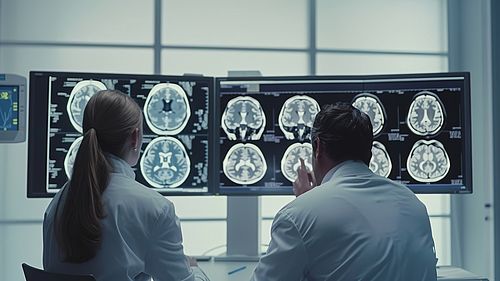17 January 2025
Complement activation and structural brain damage in multiple sclerosis
A recent study by the DKF research group of Prof. Jens Kuhle in collaboration with Prof. Jan Lünemann from the University of Münster under the first authorship of Dr. Johanna Oechtering investigated the role of complement activation in multiple sclerosis (MS) and its association with structural brain damage. The results of the study could potentially be useful for a more targeted new therapeutic approach.
The study, which is based on data from the Swiss MS Cohort (SMSC), was recently published in the scientific journal "Neurology Neuroimmunology and Neuroinflammation". In a longitudinal study, it was shown that increased levels of activated complement proteins in the cerebrospinal fluid of MS patients correlate with structural brain damage visible on MRI. Furthermore, a correlation between complement activation and the biomarker "glial fibrillary acidic protein" (GFAP) was observed. GFAP is a new biomarker that is associated with the chronic progression of MS.
The results illustrate that complement activation may not only be a marker of disease severity, but may also play a key role in the neurodegenerative processes of MS in particular. Thus, the study suggests that therapeutic approaches targeting the complement system may have the potential to slow disability progression in MS patients.
In 2024, the research group published results from the project in the same journal, which showed that increased complement activation is associated with the severity of MS as measured by recognized scores ("Expanded Disability Status Scale" (EDSS) and "MS Severity Score" (MSSS)) as well as the biomarker neurofilament light chain (NfL). This publication was recently selected by the European Charcot Foundation as one of the "10 most influential studies 2024" in the field of MS.
In summary, the published results provide valuable insights into the complex immunological mechanisms of MS and highlight the importance of complement activation as a potential target for future therapeutic interventions. The results could help to improve the clinical monitoring and treatment of MS and open up new ways to treat the disease.

What is complement activation?
Background information
Complement activation is a central component of the immune response in which a group of over 30 proteins, known as the complement system, is activated. These proteins circulate in the blood and body fluids and play a crucial role in protecting the body from infection.
Faulty complement activation can be associated with various diseases, including autoimmune diseases and inflammatory processes such as MS.
